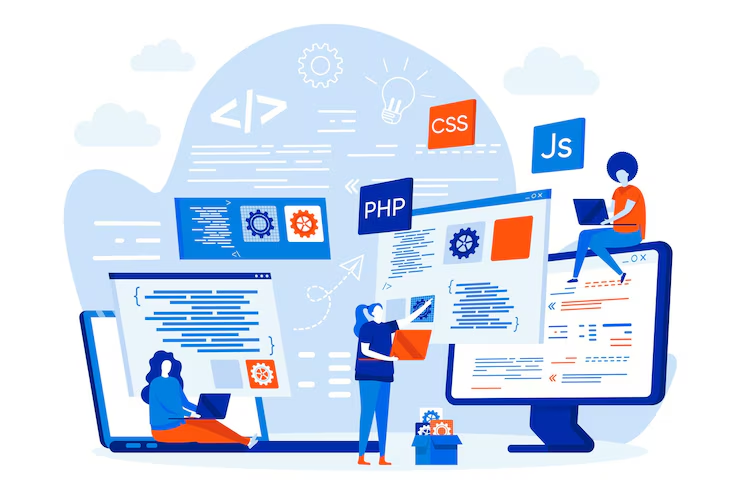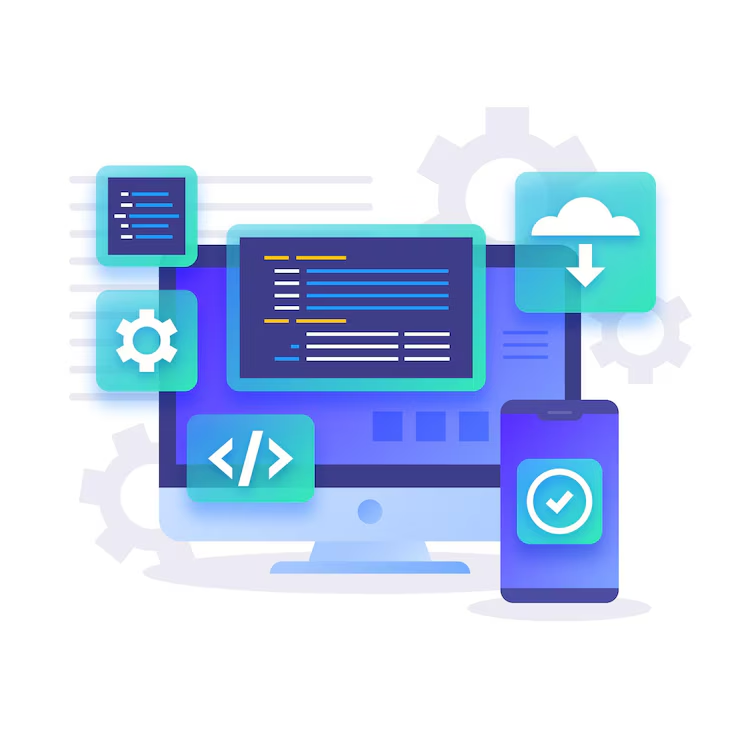What is Software Development?
Software development is the (like imagination world type) creation, design, testing, deployment, and upkeep of software programs. It includes activities/programs like coding, user interface designing, debugging, and error testing. Software can be in your mobile apps, web sites, desktop applications, and business systems used to support company functions.
Importance of Software Development in the Modern World
Almost every modern-day activity in the present technological era is run by software. From health, education, finance to transportation, all sectors depend on software to enhance productivity, improve satisfaction of the customer, automate tasks, and stay ahead of competition.
Understanding the Software Development Process
The software development process, also known as Software Development Life Cycle (SDLC), is the sequential method of developing software. It involves requirement analysis, imagining, designing, development, testing, deployment, and maintenance. Each phase ensures that the final product works, can be relied upon, and is most convenient to use.
- Requirement Analysis
- Design
- Development
- Testing
- Deployment
- Maintenance
Agile vs Waterfall Methodology
In software development, choosing the right development methodology is crucial for project success. Two of the most widely recognized models are Agile and Waterfall.
DevOps in Software Development
DevOps is a combination of development and operational functions administered as a single process that uses a mixture of human resources, tools, and technology to bring about automation and refinement in the software creation process so that products can be delivered faster and with a higher pitch of quality.
Types of Software Development
There are different types of software development, each for industries and needs. These include web development, where the emphasis is on the creation of websites and web applications; mobile app development for developing applications on Android and iOS platforms; desktop software development is for applications that are run on PCs; game development for making video games that are interactive; embedded systems development for software embedded in hardware products; and enterprise software development, where large-scale solutions are developed for companies. Each category demands specific skills and equipment specific to its specific requirements.

- Web Development
- Mobile App Development
- Desktop Software Development
- Game Development
- Embedded Systems Development
- Cloud-based Software Development
- Enterprise Software Development
Custom Software Development
Benefits of Custom Solutions
Custom software solutions provide personalized features designed to meet specific business needs, offer higher scalability to accommodate growth, and ensure better integration with existing systems for smoother workflows and improved efficiency.
Use Cases and Industries
From healthcare and finance to retail and logistics, businesses across all industries benefit from custom software. These solutions are designed to meet industry-specific requirements, improve operational efficiency, and support digital transformation efforts.
Software Development Services
Professional software development services encompass the entire project lifecycle—from initial ideation to ongoing maintenance. These services typically include UI/UX design, front-end and back-end development, quality assurance (QA) testing, and DevOps support, ensuring a seamless, high-quality software product tailored to business needs.

Software Development Designer Near Me
If you're searching for a software development designer near me, focus on finding agencies or freelancers with proven experience in your industry. A strong portfolio, positive client reviews, and an understanding of your specific business needs are key indicators of a reliable partner.
Top Software Development Companies in India
Top software development companies are found in India, which develop a variety of innovative and high-quality solutions for their clients. Companies like TCS, Infosys, and Wipro lead the software development industry and are supplemented with many mid-sized companies and new ventures, all of which include a large collection of software services to their domestic and outside clients.
Software Development Languages
Programming languages are the components of software, which allow developers to produce everything from a simple program to a system. The most popular software programming languages are JavaScript, commonly used for development in the web; Python, due to its readability and flexibility; Java, used in enterprise applications; C#, most commonly applied in Windows apps; and C++, used in performance-critical programs. The selection of a programming language is based on
the target project's goals, platform, and requirements for scalability.

- JavaScript
- Python
- Java
- C++
- C#
- PHP
- Swift
- Kotlin
Which Language Used for Software Development?
The programming language to use depends on what kind of software is being developed. Below are some of the common languages and their major uses:
- Python is great for AI and automation.
- JavaScript is used for web development.
- Java and Kotlin are preferred for Android apps.
- Swift is used for iOS apps.
Top Tools Used in Software Development
Some of the top tools used in software development include:
- Git and GitHub for version control
- Visual Studio Code and IntelliJ for coding
- Jira and Trello for project management
- Jenkins for CI/CD
- Postman and Selenium for testing
Software Development: Free vs Paid
Whether to use open source tools or paid software development tools has always been a heated debate. Open-source tools are the best option for budget-deprived developers and micro-teams because they let users enjoy the flexibility, community support, and no licensing costs. Normalily, though, a paid tool will boast of professional support, better security, enhanced functionalities, and better scalability, often making it the favorite solution to an enterprise-class project and a long-term development necessity. The right decision depends on project size, budget, and functionality implemented.
Career in Software Development
A career in software development is both challenging and rewarding since it offers opportunities to work on projects cutting-edge among many domains. As technology advances, it requires skilled developers in nearly every industry, including web development and mobile apps, but increasingly also in artificial intelligence and cloud computing. If the specific technical competencies, problem-solving abilities, and a learning bent of mind are present, one can carve out a sustainable and satisfying career in the technology sector.
How to Become a Software Developer
To become a software developer:
- Learn programming languages
- Understand computer science fundamentals
- Work on real projects
- Build a portfolio
- Apply for internships or junior roles
Software Developer Skills
Essential software developer skills include:
- Proficiency in at least one programming language
- Knowledge of data structures and algorithms
- Problem-solving abilities
- Database management
- Version control (e.g., Git)
Certifications and Online Courses
Courses and certifications on the popular platforms, such as Coursera, Udemy, edX, or LinkedIn Learning, are well-regarded courses and certifications that help aspiring developers acquire those skills and move ahead with their careers.
Building a Portfolio
Portfolio development is very important because it helps one to show projects, GitHub repositories, and design skills to leave a lasting impression on potential employers and showcase his or her hands-on skills.
Software Development Jobs
Jobs in Software Developers: Software development jobs are many in various fields such as IT, healthcare, fintech, eCommerce, and so on. These sectors consistently make a demand for developers extraordinaire who can craft entirely new software applications and maintain the ones that keep the business moving forward.
Software Developer Jobs for Freshers
Junior Software Developer
A junior software developer plays a supporting role in a development team which includes coding, debugging, and continuous learning of new tools and technologies. This position is a step forward toward working hands-on with the advancement of technical skills.
Software Developer Job Description
The software developer is expected to do design, code, test, and install software programs that satisfy the business and user needs. The job description includes:
- Writing clean, scalable, and high-performance code employing best practices on high performance and maintainability.
- Debugging, problem-solving, and correcting software defects and errors to ensure the highest functionality.
- Testing methods end to end, including unit testing and integration testing, to guarantee quality and reliability of software.
- Collaborating closely within cross-functional teams, such as designers, testers, product managers, and DevOps engineers, to provide seamless software solutions.
- Participating in code reviews to uphold quality and exchange knowledge between the personnel.
- Refactoring and maintaining existing software by integrating new features, optimization in performance, and compatibility to evolving environments.
- Documentation of designs, processes, and code of software for a smooth transition for future maintenance and development.
- Keeping abreast of cutting-edge technologies, tools, and industry trends, thereby enriching the development practices.
- Supporting project estimations and sprint planning in Agile environments.
- Implementing software security incorporating best-practice guidelines by developing in security features.
Remote and Freelance Opportunities
The major reasons fuelling the popularity of a remote freelance software development career are increasing flexibility given to developers to work from anywhere in the world. Such opportunities let the participants build flexible schedules, join different teams, and choose interesting projects in their area of specialization and expertise. With organizations moving toward the adoption of remote work, there is an ever-increasing demand for freelance developers on a daily basis, creating a huge number of opportunities across sectors. The commuting hours and money get saved, allowing the exposure to new technologies and workflows that lead to everlasting learning and development. Salary of Software Development in India
Software Development Salary in India
Software development salaries in India vary widely. Such difference is context dependent on a number of factors such as location, years of experience, skills, industry, etc. The big metropolis such as Bangalore, Hyderabad, Pune, and Mumbai boasts of high salaries on account of higher concentration of tech companies. Generally, the pay for entry-level developers is decent but escalates significantly with experience, niche skills, and expertise in technologies in demand such as AI, cloud computing, and cybersecurity.
Beginners Salary in Software Development
At entry levels of a career in software development, freshers may expect salary anywhere between ₹3,00,000 and ₹6,00,000 per annum (LPA) depending on the size, reputation, and cost of living of the city-specific to the company. Bigger the company and bigger the city, greater will be the initial salary amassed by a freshly hired employee.
Software Development Salaries in Indore
An average salary of a junior software developer in Indore stands between ₹2.5 to ₹5 lakhs per annum (LPA). It indicates the growing IT sector in the city and quite less cost of living as compared with major metro cities; hence, Indore is a good place for fresher jobs.
Software Development Salaries in Dehli and Mumbai
Delhi and Mumbai houses software developers whose average annual earnings range between ₹5 to ₹10 lakhs (LPA). Their large metropolitan cities boast a strong demand for talent among developers, a very competitive market in tech, and higher living costs.
Salary by Job Role
- Frontend Developer: ₹4–8 LPA
- Backend Developer: ₹5–10 LPA
- Full Stack Developer: ₹6–12 LPA
- DevOps Engineer: ₹7–14 LPA
Future of Software Development
Role of Artificial Intelligence and Machine Learning
AI and ML are the new forces shaping the future of software development, turning manual jobs such as testing, coding, and fault finding into automated processes. This ensures that additional speed is being added to an already fast-paced process of development, which is an added benefit, while other processes are diminished through human error and faulty logic. Debugging is yet another process within software development that can be enhanced. These tools make the lives of developers easy to optimize codes or foresee pinch points of potential problems in a way that software solutions become a lot smarter and reliable.
Low-Code and No-Code Platforms
Low-code and no-code platforms are increasingly transforming application development, allowing non-programmers to build applications quickly with little or no technical knowledge. Low-code and no-code platforms minimize heavy coding by using visual development interfaces paired with pre-built components, thereby accelerating the digital transformation of organizations, enhancing the operational efficiencies of such organizations, and allowing many more users to personalize their own solutions.
Trends Shaping the Future
- Cloud-native development
- Microservices architecture
- Cross-platform app development
- Blockchain-based applications
Conclusion
Frequently Asked Questions
1. What is development in software? Software development represents programming or application development by engineers according to a systematic methodology or approach of planning, designing, coding, testing, and maintaining where the very approach concerns solving real-world problems with the use of technology and rests for almost every solution that is digitalized today.
2. Which coding language is optimal for the beginner? Python is the most widely considered ideal language as the primary one for beginners because of its inherent basic syntax, readable format, and versatility. It is on web development, data science, automation, artificial intelligence, etc., and thus a phenomenal base for many careers.
3. What is the salary of freshers in software in India? The annual salary gets engraved in the range of ₹3 to ₹6 lacs for freshers in the field of software development in India. The actual salary varies based on the hiring company, job location, technical skills, and even the educational background.
4. What are the differences between Agile and Waterfall methodologies? Agile is a flexible and iterative development methodology that emphasizes on continuous delivery of small but functional parts of the project coupled with continuous feedback from end users while Waterfall is a linear approach to develop the system in which one must finish the earlier phase before entering the next and thus making this type of development more rigid while suitable for well-defined projects.
5. Do software developers work from home? Yes, software development is one of the most remote-friendly professions. Most of the companies have fully remote positions, while some offer freelance opportunities. Good tools and well-honed communication skills allow developers to work very well with teams that are scattered around the globe.
Read our top other articles:
Software Development Services Graphic Design: A Complete Guide for Beginners and Businesses in 2025 search jobs here
















